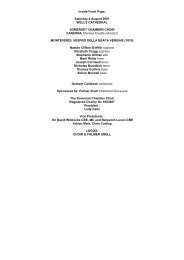Click here to view the concert programme - Somerset Chamber Choir
Click here to view the concert programme - Somerset Chamber Choir
Click here to view the concert programme - Somerset Chamber Choir
Create successful ePaper yourself
Turn your PDF publications into a flip-book with our unique Google optimized e-Paper software.
an indication that 12th century concerns were not that different from our own time! Because <strong>the</strong> poetry was meant <strong>to</strong> be<br />
readily unders<strong>to</strong>od, it was written ei<strong>the</strong>r in vernacular Latin (ra<strong>the</strong>r than church Latin) or in medieval French or German. The<br />
poetry is often satiric or humorous, and nei<strong>the</strong>r secular nor ecclesiastical authority is spared. T<strong>here</strong> are many allusions <strong>to</strong><br />
well-known classical tales as well as contemporary events. Some of <strong>the</strong> poetry is bawdy and filled with delicious doubleentendres.<br />
The overall <strong>the</strong>sis of <strong>the</strong> collection is that, in both life and love, man is <strong>the</strong> pawn of capricious fate. The frontispiece<br />
of <strong>the</strong> manuscript is illustrated with a Wheel of Fortune, a common medieval motif. Figures at <strong>the</strong> cardinal points of <strong>the</strong> wheel<br />
are labelled “I reign”, “I have reigned”, “I have no reign”, and “I shall reign again”.<br />
For Carmina Burana, Orff selected 24 poems which he grouped in<strong>to</strong> <strong>the</strong>matic categories. The piece opens with Fortuna,<br />
Imperatrix Mundi (Fortune, Empress of <strong>the</strong> World), which introduces images of <strong>the</strong> capriciousness of fate and <strong>the</strong> Wheel<br />
of Fortune. The next section, Primo vere (Springtime), contains poems dealing with <strong>the</strong> arrival of spring, when men’s (and<br />
women’s) fancies turn <strong>to</strong>ward romance. A subsection, Uf dem anger (On <strong>the</strong> lawn) is a series of dances. The next section,<br />
In taberna (In <strong>the</strong> tavern) contains <strong>the</strong> most ribald poetry and includes one of <strong>the</strong> great drinking songs of all time. The final<br />
section, Cours d’amour (The Court of Love), represents a long and sometimes circui<strong>to</strong>us journey <strong>to</strong>ward amorous bliss. It<br />
concludes with a reprise of <strong>the</strong> opening O Fortuna chorus, as <strong>the</strong> Wheel of Fortune continues <strong>to</strong> turn full circle.<br />
Orff’s music for Carmina Burana reflects much of <strong>the</strong> <strong>the</strong>ory he developed in his Schulwerk. The music is highly rhythmic<br />
and features not only an extensive percussion section but also occasionally percussive use of <strong>the</strong> text. Harmonically, he<br />
pares his music down <strong>to</strong> its essential elements. The choral parts are all homophonic and largely consist of unison singing<br />
or lines harmonised in thirds. They are set above instrumental parts which feature rhythmic or harmonic ostina<strong>to</strong>s. Orff<br />
composes in short musical phrases, and each section may have several distinctive phrases which repeat with each<br />
subsequent verse. While <strong>the</strong> overwhelming feeling is one of rhythmic energy, t<strong>here</strong> is considerable variation in <strong>the</strong> treatment<br />
of <strong>the</strong> different poems, and Orff also displays a wonderful melodic inventiveness. Carmina Burana was premiered in Frankfurt<br />
in 1937 <strong>to</strong> great success. It was originally staged, with dancing and mime accompanying <strong>the</strong> music. But Orff’s music is so<br />
powerful and evocative that it easily stands on its own and now is usually performed in a <strong>concert</strong> setting.<br />
FORTUNA IMPERATRIX MUNDI (Fortune, Empress of <strong>the</strong> World)<br />
1 O Fortuna (O Fortune)<br />
O Fortuna<br />
velut luna<br />
statu variabilis,<br />
semper crescis<br />
aut decrescis;<br />
vita detestabilis<br />
nunc obdurat<br />
et tunc curat<br />
ludo mentis aciem,<br />
egestatem,<br />
potestatem<br />
dissolvit ut glaciem.<br />
Sors immanis<br />
et inanis,<br />
rota tu volubilis,<br />
status malus,<br />
vana salus<br />
semper dissolubilis,<br />
obumbrata<br />
et velata<br />
michi quoque niteris;<br />
nunc per ludum<br />
dorsum nudum<br />
fero tui sceleris.<br />
Sors salutis<br />
et virtutis<br />
michi nunc contraria,<br />
est affectus<br />
et defectus<br />
semper in angaria.<br />
Hac in hora<br />
sine mora<br />
O Fortune,<br />
like <strong>the</strong> moon<br />
you are changeable,<br />
ever waxing<br />
and waning;<br />
hateful life<br />
first oppresses<br />
and <strong>the</strong>n soo<strong>the</strong>s<br />
as fancy takes it;<br />
poverty<br />
and power<br />
it melts <strong>the</strong>m like ice.<br />
Fate - monstrous<br />
and empty,<br />
you whirling wheel,<br />
you are malevolent,<br />
well-being is vain and<br />
always fades <strong>to</strong> nothing,<br />
shadowed<br />
and veiled<br />
you plague me <strong>to</strong>o;<br />
now through <strong>the</strong> game<br />
I bring my bare back<br />
<strong>to</strong> your villainy.<br />
Fate is against me<br />
in health<br />
and virtue,<br />
driven on<br />
and weighted down,<br />
always enslaved.<br />
So at this hour<br />
without delay<br />
corde pulsum tangite;<br />
quod per sortem<br />
sternit fortem,<br />
mecum omnes plangite!<br />
2 Fortune plango vulnera (I bemoan <strong>the</strong> wounds of Fortune)<br />
Fortune plango vulnera<br />
stillantibus ocellis<br />
quod sua michi munera<br />
subtrahit rebellis.<br />
Verum est, quod legitur,<br />
fronte capillata,<br />
sed plerumque sequitur<br />
Occasio calvata.<br />
In Fortune solio<br />
sederam elatus,<br />
prosperitatis vario<br />
flore coronatus;<br />
quicquid enim florui<br />
felix et beatus,<br />
nunc a summo corrui<br />
gloria privatus.<br />
Fortune rota volvitur:<br />
descendo minoratus;<br />
alter in altum <strong>to</strong>llitur;<br />
nimis exaltatus<br />
rex sedet in vertice –<br />
caveat ruinam!<br />
nam sub axe legimus<br />
Hecubam reginam.<br />
pluck <strong>the</strong> vibrating strings;<br />
since Fate<br />
strikes down <strong>the</strong> strong man,<br />
everyone weep with me!<br />
I bemoan <strong>the</strong> wounds of<br />
Fortune with weeping eyes,<br />
for <strong>the</strong> gifts she made me<br />
she perversely takes away.<br />
It is written in truth,<br />
that she has a fine head of<br />
hair, but when it comes <strong>to</strong><br />
seizing an opportunity<br />
she is bald.<br />
On Fortune's throne<br />
I used <strong>to</strong> sit raised up,<br />
crowned with <strong>the</strong> manycoloured<br />
flowers of prosperity;<br />
though I may have flourished<br />
happy and blessed,<br />
now I fall from <strong>the</strong> peak<br />
deprived of glory.<br />
The wheel of Fortune turns;<br />
I go down, demeaned;<br />
ano<strong>the</strong>r is raised up;<br />
far <strong>to</strong>o high up<br />
sits <strong>the</strong> king at <strong>the</strong> summit –<br />
let him fear ruin!<br />
for under <strong>the</strong> axis is written<br />
Queen Hecuba.












